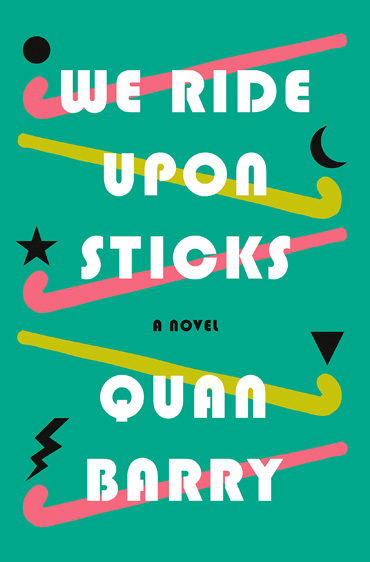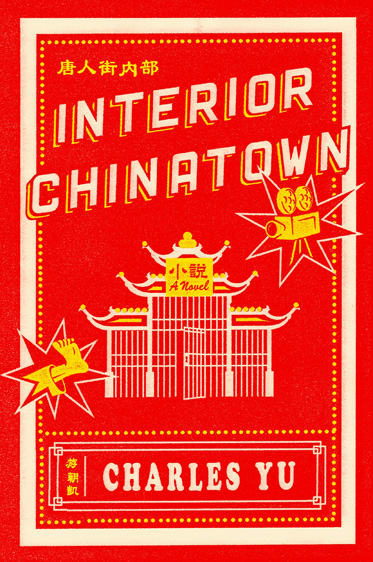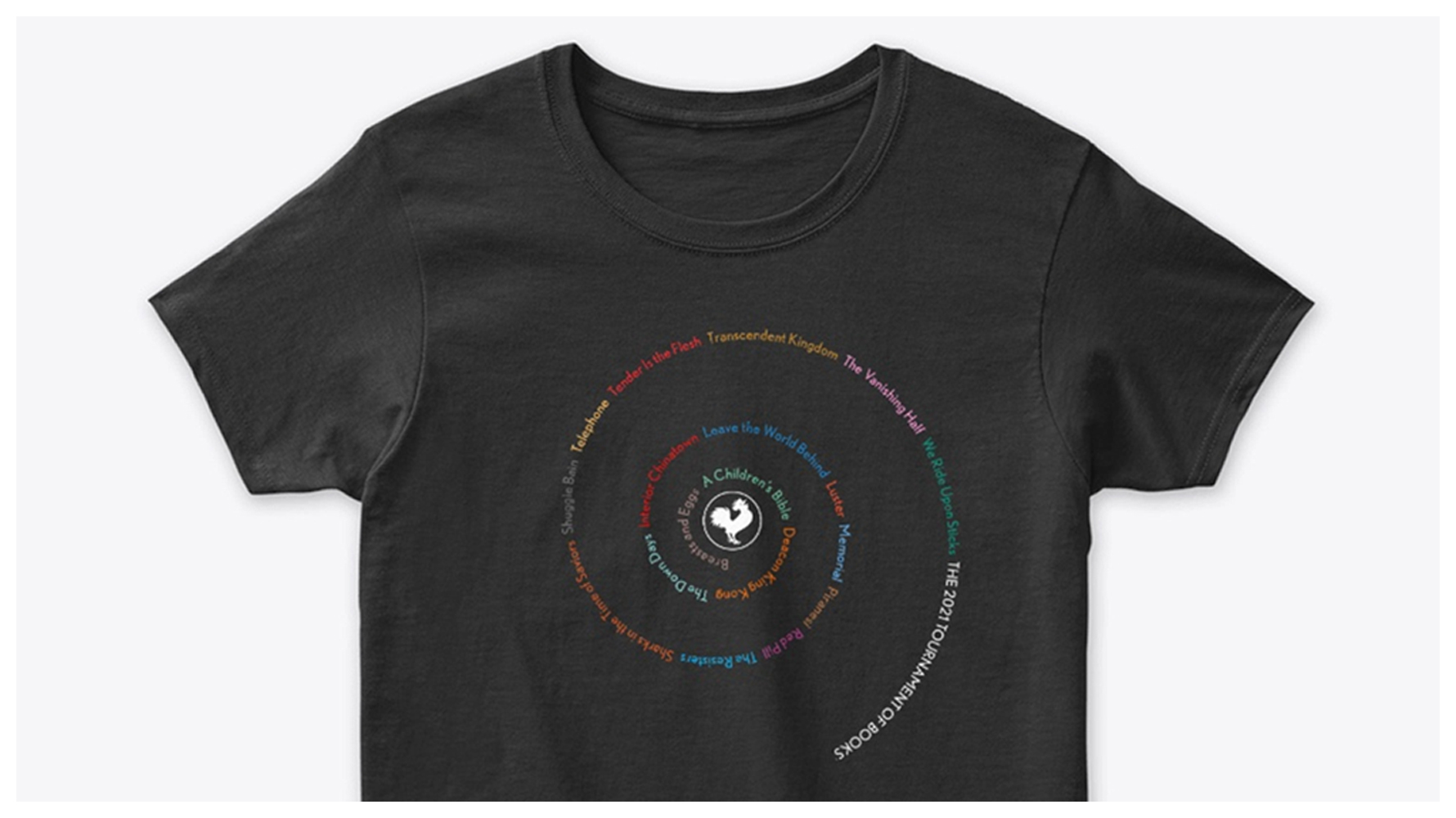-
March 22, 2021
Quarterfinals
-
Quan Barry
4We Ride Upon Sticks
v.
2Interior ChinatownCharles Yu
-
Judged by
Sufiya Abdur-Rahman
For some people, invisibility is a superpower, imbuing them with gifts to vanish and evade at will, surprising the unsuspecting and, in that way, gain the upper hand. For others, invisibility is a debilitating weakness, rendering people powerless without the ability to attract or hold attention and, as a result, fulfill their needs. There seems to be no in-between. As a petite, reserved, Black Muslim girl, I used to wonder where I fit as I watched fictional characters either relish their invisibility or loathe it, cursing it and their existence in it until they found their way into the visible world.
The latter is where we begin the story of Willis Wu in Interior Chinatown. Willis is the lowest of the low in his world, the set of a police procedural TV show starring a fine Black male detective and a pretty white female detective, where Willis only gets to play Generic Asian Man and dream of one day working his way up to Kung Fu Guy. Willis lurks in the background, delivering Chinese food and sweeping the Golden Palace Restaurant floor, until he happens into a role as Special Guest Star and gets the chance to parlay his life into something more. Written as a screenplay where we not only follow Willis’s desperate attempts to be seen, Interior Chinatown’s clever second-person point of view forces us to experience them as well.
Quan Barry’s novel, We Ride Upon Sticks, on the other hand, portrays the condition of invisibility as powerful. Hers is the story of a 1989 girls field hockey team near Salem, Mass., of witch trial fame, that experiments with amateur witchcraft to turn the group of anonymous losers into a united force with which to be reckoned. Once the players commit to each other—and the forces of darkness—their winning streak becomes unstoppable and their bond unbreakable. We get a chance to know each girl, and one boy, individually, but through the book’s first-person-plural point of view, it’s clear that the individuals disappear in favor of strengthening the team.
I finished Interior Chinatown just as news broke that actor Daniel Dae Kim, after 31 years of TV roles, including on Lost and Hawaii Five-0, would finally get a chance to lead a series. Sure, it would be alongside Tony Goldwyn, who still gives me the creeps from his role in Ghost, and likely for just a season on the anthology series The Hot Zone on National Geographic, a channel I’ve probably watched once. The important thing is that after stereotypically playing a doctor more than a few times and even once, in 2006, a character literally billed as “Chinese Man,” Kim, who’s actually Korean American, had transcended his relative invisibility.
Invisible Chinatown casts this dilemma of the sometimes-Special Guest Star and often Generic Asian Man just right, with humor, depth, and an appropriate amount of introspection. As the Black and white cops—whose show, in a flash of genius, is called Black and White—talk to each other about needing Willis’s help at one point, they call him the “Asian Guy.” Yu steps back from the dialogue to write:
Two words that define you, flatten you, trap you and keep you here. Who you are. All you are. Your most salient feature, overshadowing any other feature about you, making irrelevant any other characteristic. Both necessary and sufficient for a complete definition of your identity: Asian. Guy.
There’s a full range of Note Books and related stationery products at fieldnotesbrand.com. Field Notes is proud to once again be a sponsor of the Tournament of Books.
Meanwhile, the characters in We Ride Upon Sticks aren’t all white but might as well be. They grew up in white environments and again, the identity of the group trumps the significance of individuality. Barry writes of the only Vietnamese American girl on the team:
Honestly, we’d stopped noticing that part about her a long time ago. After all, Julie Kaling wasn’t the only brown kid in a white family… The race of these kids didn’t matter. For all intents and purposes, they were seen as being white just like the rest of us… Being “other” wasn’t what made you different. Having parents who were “other” was a whole other ball game.
Apparently, in this world, invisibility comes with a cape, knee-high boots, and an emblem on your chest. That sense of acceptance not for who any of the team members are but for who they’re with permeates the book. We Ride Upon Sticks seemingly challenges this notion by painstakingly giving each girl, and one boy, a backstory. All except for the narrator, who is supposedly a member of the team or, more so, is the team itself. Presumably, the intent was to elevate the group over the individual and make those of us who read the book feel like part of that tight collective. However, the narrator, who never speaks or gets spoken to, who contributes nothing and who has no name and no personality—no identity—acts more as a phantom presence that we can’t see or feel. It lends the narration of We Ride Upon Sticks a sense of disembodiment that prevented me from ever connecting with the person telling the story and, after 200 or so pages, no longer caring about the story they were telling. And the story went on for 360 pages.
Granted, as a tiny, shy Black Muslim woman, I know there’s no strength in spending every day about as invisible as one can get; finding the strength in it is something I have to do, but I do so unwillingly. Willis Wu had to not only figure out how to be relevant within his Interior Chinatown environment, but also whether the relevance he sought was in fact selling himself short. Like Willis, I’d much rather people see me, and all the possibilities of me, in the spotlight.
Match Commentary
By Miguel Morales & Andrew Womack
Andrew Womack: Today we’re joined in the booth by Miguel Morales of McNally Jackson Books! Miguel, please tell the readers about yourself and what you do.
Miguel Morales: I work out of the McNally Jackson store that’s located in Williamsburg, Brooklyn. I was originally hired to host events there, which for obvious plague-related reasons I’m not doing anymore. Now I mostly pack up and process web orders while I make everyone else in the store listen to Sade and Erykah Badu.
Andrew: I’d consider that a public service. Any favorite events you’ve produced, or anything in the works you’re looking forward to?
Miguel: I thought at first, at the beginning of last March’s lockdown, that I’d enjoy the break from working events, but I miss every little thing about them. I miss the cheap wine in tiny plastic cups! I miss the roundabout questions audience members ask! I miss people! This time last year Sarah Schulman had just started running a monthly series that I loved helping out at. Great readings by writers who often weren’t on my radar, and she is truly the best!
Andrew: The cups are so tiny! So let me ask: Were you persuaded by the judge today?
Miguel: Here’s where I level with you and admit I haven’t read either of these books, though I read Charles Yu’s first novel How to Live Safely in a Science Fictional Universe when it came out in 2010 and loved it. These two ToB entries, from what little I could gather reading a few pages of each along with the judge’s comments, appear to have taken really different routes to get at similar themes. I could see myself really getting into a good team-comes-together storyline, and I don’t mind narrators who feel distant (see above). But now I want to read both whereas before I probably wasn’t going to read either, so let’s celebrate that!
Andrew: You know, I will celebrate that!
I love how Judge Abdur-Rahman pinpoints this theme of invisibility in both of these novels, and how she finds that connection to her own life as well. It’s the luck of the draw that this judge is reading these two novels in the quarterfinals, but Abdur-Rahman’s insight into finding a way to compare these two books—always a central dilemma of the ToB—does, I hope, bring them to the attention of other readers who might not have otherwise picked up either book.
Relatedly, one of my absolute favorite parts about the Tournament is how we’re able to bring people books that weren’t must-reads for them. Because while of course many of the ToB faithful are heavy, year-round readers at constant risk of being crushed to death by their TBR stacks, many, many Rooster fans are people who love fiction but don’t have time to read more than one book a month, or even people who are just getting into new fiction. We’ve heard from people who say they only read one work of fiction a year, and it’s whatever wins the Tournament. They may read other books outside of that, but when it comes to fiction, it’s whatever wins the Rooster.
I’m curious, what’s it like as a bookseller, knowing you’ve got this chance to get a book in someone’s hand?
Miguel: It’s a lot of fun but also a little agonizing. Nobody wants their recs to bomb. I usually start off asking people what they’re into. Some have no idea, which I find endearing! It is hard to know what you don’t like already. On my most recent shift, the last three things I hand-sold were Jazz, The Sisters Brothers, and How Are You Peeling?: Foods With Moods, this delightful title for kids about navigating your feelings. I love placing a book with a reader that I just know is going to blow them away. It makes me feel like the world’s most wholesome drug dealer.
Andrew: Hahha. So what about new fiction. Any recommendations for our readers?
Miguel: I’m absolutely that bookseller who almost never reads new and noteworthy releases. From time to time people come up to the register and ask, “What’s just come out that you liked?” “Couldn’t tell you! Have you read The Blue Flower by Penelope Fitzgerald?” I do try to keep up with reissues or classics from other countries just translated into English for the first time. On that note I loved Claude McKay’s Romance in Marseilles, Hervé Guibert’s To the Friend Who Did Not Save My Life, The Copenhagen Trilogy by Tove Ditlevsen, and The Collected Novels of Charles Wright. And shoutout to Brontez Purnell’s 100 Boyfriends, which is actually new. What a man, what a book!
Andrew: Finally, the question we’ve asked all our bookselling guests this year: How has work been different for you during the pandemic?
Miguel: There have definitely been some times when I’ve silently shouted behind my mask, a feeling that I bet a lot of retail workers throughout this country have shared over the last year. And honestly my coworkers have been the thing getting me through the pandemic retail experience. (Shoutout to our union!) Hopefully there’s more unionizing throughout the book world.
Andrew: Awesome. Thank you for joining us today, Miguel! And now I’ll turn it over to Kevin for a quick Zombie update.
Kevin Guilfoile: With a heavy heart I must report that for We Ride Upon Sticks, the magick ends here, a few contests short of that much-desired championship—you had a great run, Emilio. If the Zombie Round were held today, Piranesi and The Vanishing Half would still be our bibliophilic bogeymen.
New 2021 Tournament of Books merch is now available at the TMN Store. As a reminder, Sustaining Members receive 50 percent off everything in our store. To find out why we’re asking for your support and how you can become a Sustaining Member, please visit our Membership page. Thank you.
Welcome to the Commentariat
Population: You
To keep our comments section as inclusive as possible for the book-loving public, please follow the guidelines below. We reserve the right to delete inappropriate or abusive comments, such as ad hominem attacks. We ban users who repeatedly post inappropriate comments.
- Criticize ideas, not people. Divisiveness can be a result of debates over things we truly care about; err on the side of being generous. Let’s talk and debate and gnash our book-chewing teeth with love and respect for the Rooster community, judges, authors, commentators, and commenters alike.
- If you’re uninterested in a line of discussion from an individual user, you can privately block them within Disqus to hide their comments (though they’ll still see your posts).
- While it’s not required, you can use the Disqus <spoiler> tag to hide book details that may spoil the reading experience for others, e.g., “<spoiler>Dumbledore dies.<spoiler>”
- We all feel passionately about fiction, but “you’re an idiot if you loved/hated this book that I hated/loved” isn't an argument—it’s just rude. Take a breath.




